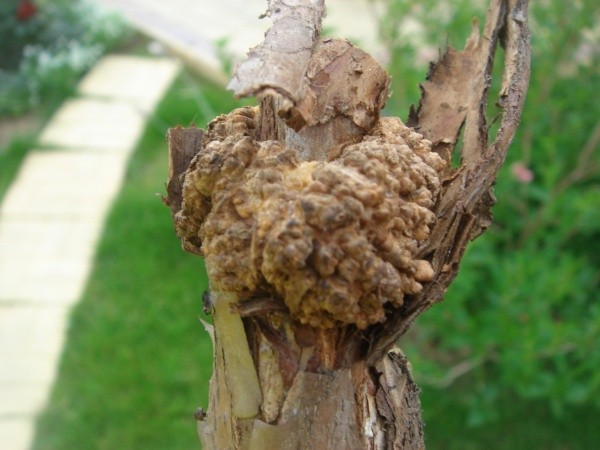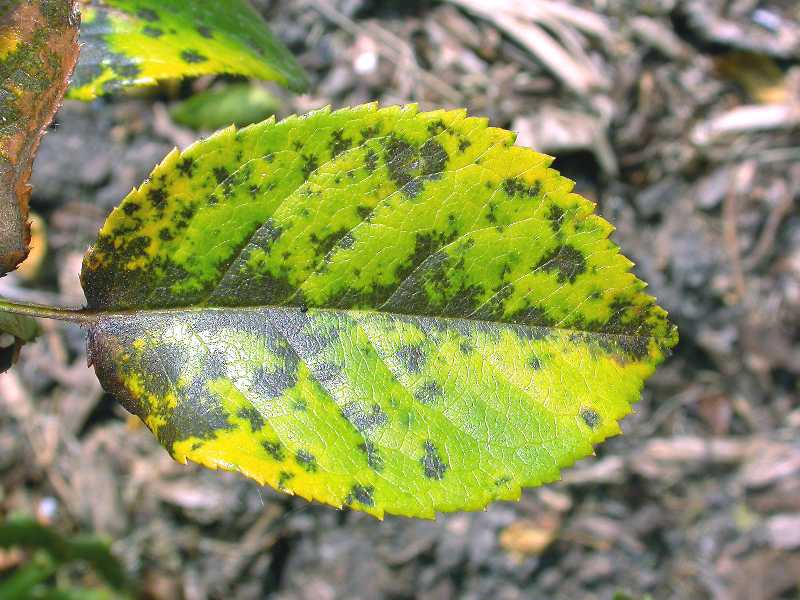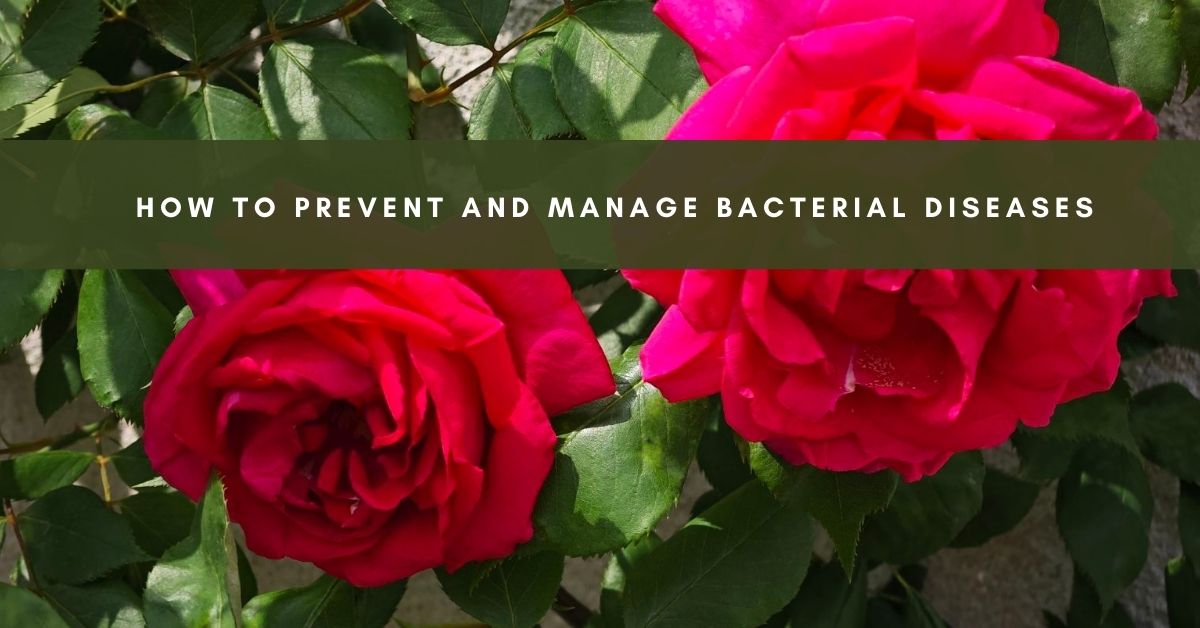Roses delight gardeners because of their timeless beauty and captivating fragrance. However, bacterial diseases can turn these garden treasures into a source of frustration if not managed effectively. Bacterial infections can wreak havoc on roses, from unsightly leaf spots to growth deformities.
Fear not! Today, we’ll look at how to protect your beautiful roses from bacterial infections.
Understanding Bacterial Diseases in Roses
Bacterial diseases are caused by microscopic pathogens that invade plant tissues, often through wounds or water. They can spread rapidly in warm, wet conditions, making early detection and management critical. Let’s delve into the most common bacterial foes that affect roses:
Crown Gall
- Symptoms: Tumorous growths (galls) on roots, stems, or crowns. These galls can restrict water and nutrient movement, weakening the plant.
- Cause: Agrobacterium tumefaciens enters through wounds.
- Spread: Contaminated soil, tools, or water.
Bacterial Leaf Spot
- Symptoms: Black or brown spots on leaves that enlarge over time, leading to yellowing and leaf drop.
- Cause: Xanthomonas campestris thrives in moist, warm environments.
- Spread: Splashing water, infected tools, or plant contact.
Bacterial Blight
- Symptoms: Dark, water-soaked lesions on stems, leaves, or flowers. Severe infections cause wilting and dieback.
- Cause: Pseudomonas syringae, often entering through frost damage or pest wounds.
- Spread: Rain, irrigation water, or contaminated plants.

Crown Gall

Bacterial Blight

Bacterial Leaf Spot
How to Spot Early Signs
- Look for unusual discoloration or spots on leaves and stems.
- Examine roots and crowns for abnormal growth.
- Monitor for stunted growth, wilting, or premature leaf drop.
Early detection is your best defense against bacterial diseases
Strategies for Prevention and Control
Practice Smart Sanitation
- Remove infected leaves, stems, or galls promptly and dispose of them away from your garden. Never compost diseased material.
- Sterilize your pruning tools after every use with a 10% bleach solution or rubbing alcohol.
Optimize Watering Techniques
- Avoid overhead watering that wets the foliage; instead, water at the base of the plant.
- Mulch around the base to retain moisture and prevent soil splash.
Plant Spacing and Air Circulation
- Space roses adequately to ensure proper air circulation.
- Prune regularly to reduce dense foliage where moisture can linger.
Use Chemical and Biological Treatments
- Apply copper-based bactericides as a preventative measure during humid seasons or at the first sign of disease.
- Introduce beneficial bacteria like Bacillus subtilis to suppress harmful pathogens naturally.
Choose Disease-Resistant Varieties
- When planting new roses, select varieties bred for resistance to common bacterial diseases.
Soil and Environment Management
- Ensure the soil is well-draining to prevent waterlogging, which encourages bacterial growth.
- Rotate crops and avoid replanting roses in infected soil without sterilization.

Get Your Free Lunar Gardener's Calendar 2025!
Join the Lunar Gardening Revolution! Subscribe now to receive our exclusive Free Lunar Gardener’s Calendar for 2025. Harness the power of the moon to optimize your planting, nurturing, and harvesting.
Emergency Action Plan for Infected Roses
- Remove Diseased Parts
Cut away infected leaves, stems, or galls with sterilized tools—clean tools between cuts to prevent the spread.
2. Apply Treatments
Use recommended bactericides or biological agents to treat infected areas. Repeat treatments as advised on the product label.
3. Improve Growing Conditions
Adjust watering schedules, enhance drainage, and monitor soil health to strengthen the plant’s natural defenses.
4. Monitor Closely
Regularly inspect the plant for signs of recurring infection, especially during wet weather.

The Organic Rose Revolution: Grow Stunning Blooms, Naturally
- Unlock the secrets of nurturing your roses organically with our guidance on soil health, natural fertilizers, and sustainable pest control methods. Your garden will thrive with eco-friendly care that respects nature’s balance.
- Empower yourself with the knowledge to craft natural remedies for common rose ailments.
- Banish pests from your garden precisely using proven strategies that safeguard your roses without harsh chemicals. Keep aphids, mites, and other invaders at bay while preserving your garden’s natural harmony.
- Explore a world of breathtaking rose varieties carefully curated to captivate your senses and elevate your garden to new heights of beauty.
A Sustainable Approach to Rose Care
Prevention is the cornerstone of a sustainable gardening practice. You can reduce chemical dependency while protecting your roses by adopting eco-friendly methods such as biological control, crop rotation, and organic mulches. Remember, a healthy rose is less likely to succumb to diseases.
Frequently Asked Questions about bacterial diseases in roses
What is the best way to prevent bacterial diseases in roses?
Choose resistant varieties, maintain good hygiene, and water wisely.
Can I use homemade remedies for bacterial diseases?
Solutions like neem oil or baking soda sprays can be effective for minor issues.
Are bacterial diseases contagious between plants?
Yes, they can spread via water, tools, and infected debris.
How do I identify bacterial blight?
Look for rapid browning and wilting of leaves and shoots, especially in humid conditions.
Can I save a rose plant with crown gall?
If the infection is severe, removal is best. For mild cases, cut away the gall and sterilize tools.
Do all roses get bacterial diseases?
While all roses are susceptible, resistant varieties are less likely to be affected.
Want more gardening tips? Subscribe to our newsletter for monthly advice straight to your inbox!

